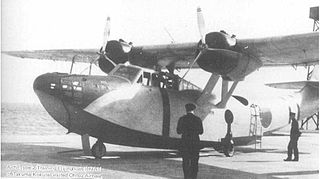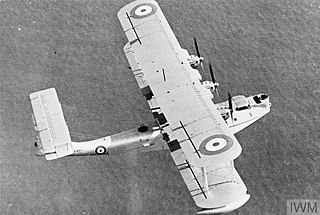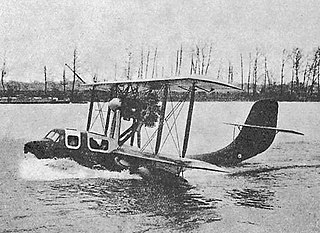Related Research Articles

The Convair R3Y Tradewind was an American 1950s turboprop-powered flying boat designed and built by Convair.

The Aichi H9A was an Imperial Japanese Navy Air Service flying boat used during the first years of World War II for crew training. An uncommon type, it was not encountered by Allied forces until spring 1945, and was never assigned an Allied reporting name.

The Blackburn Perth was a British flying boat which was in service during the interwar period. It was essentially an upgraded Iris, and hence the largest flying-boat to serve with the Royal Air Force at the time.

The SIAI S.8 was an Italian 1910s two-seat reconnaissance flying boat.

PZL.12 (PZL-H) was a prototype of a Polish amphibious flying boat designed and built in 1931 by Zygmunt Puławski, a pioneering Polish designer. He was killed in a crash involving this design.

The Savoia-Marchetti SM.62 was an Italian single-engine maritime patrol flying boat produced from 1926. It served with the Regia Aeronautica and with a number of foreign users, and was licence-produced in Spain and the Soviet Union. Some of the Spanish aircraft were still in service during the Spanish Civil War

The Franco-British Aviation Model 290 was a French four-seat amphibian flying boat built by the Franco-British Aviation Company (FBA) as a replacement for the Model 17 in French naval service.

The FBA Type 310 was a 1930s French touring flying boat or amphibian built by the Franco-British Aviation Company.

The FBA Type A and the similar Type B and C were a family of reconnaissance flying boats produced in France prior to and during World War I. All three were unequal-span pusher biplane flying boats with a single step hull made of ash longerons covered in laminated wood, divided by bulkheads into eight compartments. The empennage was carried on an upswept curved extension of the hull made from steel tubing. The pilot and observer sat side by side in the open cockpit.

The FBA Type H was a French reconnaissance flying boat produced in large numbers in France and Italy during World War I by Franco-British Aviation.

The FBA 19 was a flying boat bomber developed in France in 1924 by Franco-British Aviation.

The Lohner L was a reconnaissance flying boat produced in Austria-Hungary during World War I. It was a two-bay biplane of typical configuration for the flying boats of the day, with its pusher engine mounted on struts in the interplane gap. The pilot and observer sat side by side in an open cockpit, and both the upper and lower sets of wings featured sweepback.

The Norman Thompson N.T.2B was a British single-engined flying boat trainer of the First World War. A single-engined biplane, the N.T.2B was adopted as a standard flying boat trainer by the Royal Naval Air Service, training pilots for larger patrol flying boats such as the Felixstowe F.2.

The Boeing Model 6D, a.k.a. Boeing Model 6E, Boeing B-1D and Boeing B-1E, was an American pusher biplane flying-boat built by Boeing between 1928 and 1929.

The Lioré et Olivier LeO H-180 was a 1920s French two-seat flying-boat built by Lioré et Olivier.
The FBA Avion Canon was a two-seat cannon-armed biplane fighter, designed and built in France from 1916. due to unsatisfactory performance, development of the Avion Canon was abandoned.
The Grigorovich MUR-1,, was a trainer flying boat built in the Soviet Union in the mid-1920s.
The FBA 10 was a reconnaissance flying boat built in France in the early 1920s.
The FBA 16 HE2,, was a flying boat trainer built in France in the early 1920s.
The FBA 270 was a flying boat trainer built in France in the early 1920s.
References
- ↑ "F.B.A. 13 HE 2 - Hydravion d'entrainement - Un siècle d'aviation française". Aviafrance.com. 1997-01-26. Retrieved 2022-08-31.